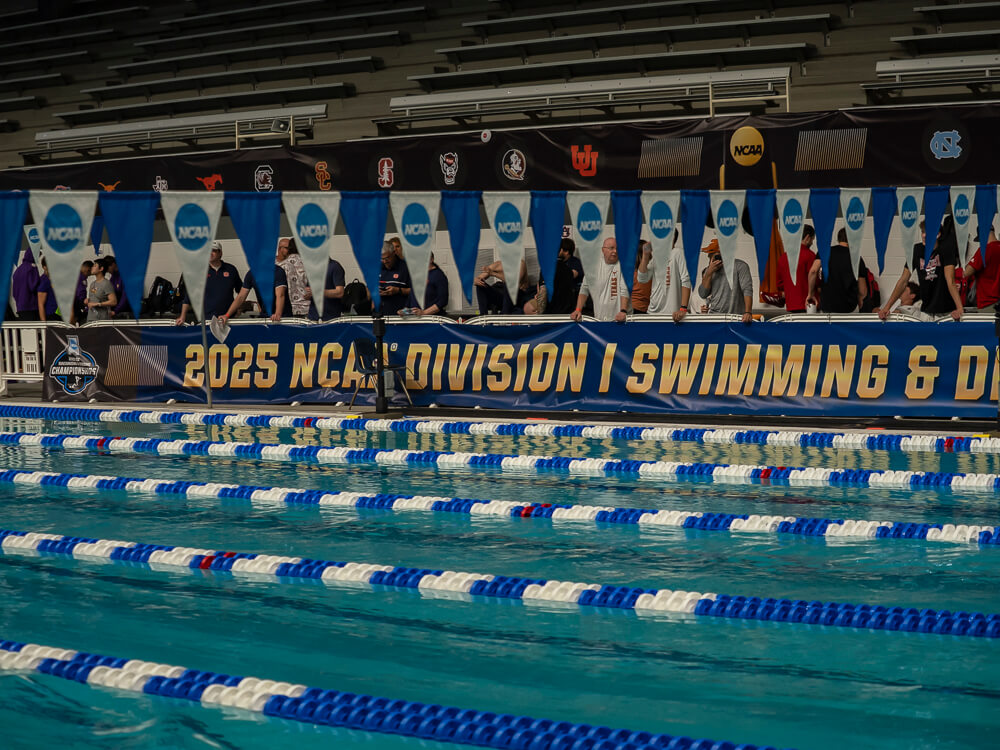Judge Officially Approves Historic House Settlement
The judge presiding over the House settlement between NCAA athletes and schools approved the multibillion-dollar plan late Friday night.
Judge Claudia Wilken approved the deal between the NCAA and Division I athletes brought in The House v. NCAA, a court case brought with swimmer Grant House as the lead plaintiff. It settles three separate antitrust lawsuits against the NCAA in federal courts and results in a $2.8 billion settlement.
July 1 has loomed as a deadline for when colleges would need to begin compensating athletes via revenue sharing for the next school year. The sides presented plans at a hearing in April, and Wilken signaled initial reluctance in the plans put forth. But that has been resolved via decision in the U.S. District Court of the Northern District of California.
The $2.8 billion is back damages, to be paid over the next 10 years, to athletes who played college athletics in the NCAA power conferences dating back to 2016 and should’ve been compensated as employees. Schools will now have a cap, set at roughly $20.5 million per school per year, to pay athletes as they choose, with elevators in that amount each year for the 10-year deal. New payments would be in addition to scholarship and other benefits, and it would be separate from some classifications of name, image and likeness (NIL) money.
The new watchdog
As part of the agreement, Major League Baseball executive Bryan Seeley has been appointed as the CEO of the College Sports Commission (CSC), “an independent body that will be responsible for implementing the settlement terms governing revenue sharing, student-athlete Name, Image and Likeness (NIL) deals and roster limits.”
The job takes enforcement away from the NCAA and installs the commission as a check on athletes compensation by member schools (though the NCAA maintains oversight of academic eligibility).
Seeley was the Executive Vice President of Legal and Operations for MLB. He’s a former Assistant United States Attorney in Washington, D.C.
From the inaugural CSC press release:
The Commission will investigate any potential violations of these rules, make determinations regarding potential rules violations and penalties, provide notice and opportunity to be heard, participate in the arbitration process and ultimately administer penalties for violations of these rules.
The new landscape
The “revenue sharing cap” number of $20.5 million is set as “up to 22% of the average revenue among schools in the ACC, Big Ten, Big 12, Pac-12 and SEC from media rights, ticket sales, and sponsorships.” In addition to the College Sports Commission, a new acronym enters the vernacular: The College Athlete Payment System (CAPS) to be used by athletic departments to manage and report payments.
The new system includes an NIL Go portal, which can bring reporting and transparency to that aspect of athlete compensation.
Ratification of the House settlement means the end of NCAA scholarship limits. In its place are roster limits for each sport, which the CSC calls a “significant increase in scholarship opportunities for student-athletes”. (These are the limits that many college swimming programs have already been cutting toward.)
That means that the NCAA’s enforcement is greatly neutered in this new era.
“With the defendant conferences leading administration and enforcement of the now approved settlement terms related to financial benefits, we will increasingly shift our focus at the NCAA away from enforcing rules prohibiting and limiting financial benefits in college sports, which has been the source of many of the recent challenges,” wrote NCAA president Charlie Baker in an open letter. “We can now turn toward what most agree is our primary function: providing a world-class academic and athletics experience. With these changes in place, including release from future litigation on these subjects for the next decade, the foundation of college sports is stronger than at any point in years. The NCAA can increase focus on reforming clunky governance structures and, most importantly, prioritizing fair competition, academics and student-athlete well-being.”
Dates to know
June 15 is the opt-in deadline for school that were not defendants in the case to revenue-sharing plans.
July 1 is the first date that colleges can begin sharing revenue with student-athletes. Recipients must be designated by July 6 (so essentially a roster settlement date).
Fall sports have until the first day of the academic year to be in compliance with roster limits. Winter and spring sports have until their first day of competition or Dec. 1 at the latest.
What they’re saying
“The approval of the House settlement agreement represents a significant milestone for the meaningful support of our student-athletes and a pivotal step toward establishing long-term sustainability for college sports, two of the Southeastern Conference’s top priorities,” SEC commissioner Greg Sankey said. “As the journey to modernize collegiate sports continues, we remain focused on identifying and implementing innovative opportunities for our student-athletes across all sports while maintaining the core values that make collegiate athletics uniquely meaningful.”
“We look forward to implementing this historic settlement designed to bring stability, integrity and competitive balance to college athletics while increasing both scholarship and revenue opportunities for student-athletes in all sports,” said Tony Petitti, Commissioner of the Big Ten Conference.
“This is a significant moment for college athletics that will provide unparalleled opportunities for student-athletes,” said Jim Phillips, commissioner of the ACC. “We look forward to implementing this new system which offers much-needed transparency and structure to create a more sustainable model for the long-term future of college athletics.”
“As we enter this new era of college athletics, it is crucial we do so with structure, transparency, and the success of student-athletes in mind — this settlement and new model will ensure that happens,” said Big 12 Commissioner Brett Yormark. “I look forward to working alongside my colleagues to implement this new system that prioritizes fairness and opportunity for all student-athletes and institutions.”
Read more

